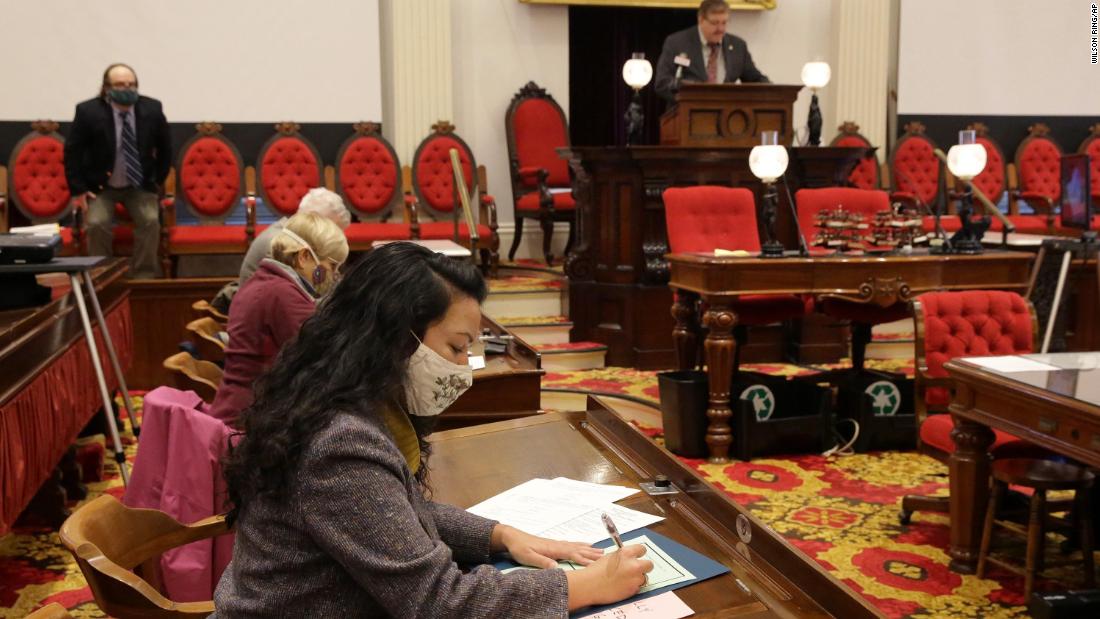
Vermont's three electors were the first to cast their votes for Biden just after 10 a.m. ET, with Tennessee following shortly after with 11 votes for President Donald Trump. Electors for all 50 states and the District of Columbia will meet separately Monday to cast their ballots for president, formally certifying the election result for Biden.
It's a constitutionally-mandated ritual that's typical no more than a curious afterthought following a presidential election, but the Electoral College vote has taken on newfound significance this year as Trump and his GOP allies make unprecedented efforts to subvert the popular will of the voters and overturn Biden's November victory.
Trump has continued to spread false claims of widespread fraud despite courts in all of the battleground states rejecting his campaign's challenges to the election. The Supreme Court dealt the final blow against his efforts to overturn the election result late Friday, dismissing a case brought by the Texas attorney general that sought to disenfranchise millions of voters in four states.
While Trump has directed most of his Twitter ire at the courts and the GOP state officials who have properly certified their states' election results for Biden, he turned his attention to the Electoral College vote on Sunday evening with even more false claims. In a Fox News interview over the weekend, Trump claimed "it's not over" and vowed to keep fighting to stay in office.
The heightened attention on today's Electoral College voting has prompted several states to put in place security protocols due to concerns over safety, threats and protests.
The Michigan House and Senate offices are closed to the public Monday after "credible threats of violence" as the state's 16 electors prepare to cast their votes for president and vice president, a spokeswoman told CNN.
In Arizona, the electors will meet at an undisclosed location, according to the public information office for the Secretary of State. And in Wisconsin, electors are being told to use an unmarked entrance with police escort, according to one of the electors.
A Michigan House Republican was stripped of his committee assignments for the rest of the term after inciting violence around protests expected later Monday in Lansing during a local radio interview. Michigan House Speaker Lee Chatfield and Speaker-elect Jason Wentworth released a statement on Monday condemning the comments of House Republican Rep. Gary Eisen, who told a local radio he could not offer assurances there wouldn't be violence on Monday.
Eisen, one of the Michigan lawmakers to support the Texas attorney general lawsuit that was dismissed by the Supreme Court, would not give details about the events unfolding in Lansing beyond saying, "It's going to be violence, it's going to be protests."
Monday's Electoral College vote is not the final step in the constitutional process of selecting a president. The votes cast on Monday are sent to Congress, where they will be counted on January 6 in a joint session led by Vice President Mike Pence.
Many congressional Republicans who have refused thus far to say that Biden won the election have claimed they are waiting for Monday's Electoral College vote to certify the results. But some of Trump's staunchest House Republican allies are preparing for a floor fight when the votes are counted in Congress next month.
Lawmakers can dispute a state's election result. But a challenge can only be considered if both a House member and senator sign onto it. So far only House Republicans have said they will contest the results, although some GOP senators have suggested they are considering joining.
Even if a senator signs on to challenge the results, it's only delaying the inevitable. In that case, the House and Senate separately debate the matter for two hours and vote on it. Democrats control the House, and enough GOP senators have already said they reject Trump's claims of fraud that a challenge would not succeed there either.
After the state electors cast their ballots on Monday, those results will be certified and sent to Congress, the National Archives and to the courts.
The states' electors are meeting throughout the day, as each state sets its own rules for how electors meet and vote. At least one state -- Nevada -- is meeting virtually due to the pandemic.
Electors are picked by the state parties before the November election. Federal lawmakers are not allowed to be electors, but the slates usually include local officials and party alumni. In New York, for instance, former President Bill Clinton and former Secretary of State Hillary Clinton will ceremonially cast electoral votes for Biden.
The Electoral College votes will conclude later Monday evening, when California's electors meet at 5 p.m. ET and Hawaii's at 7 p.m. ET.
"news" - Google News
December 14, 2020 at 10:37PM
https://ift.tt/3njQojd
Electoral College opens with voting in Vermont, Tennessee - CNN
"news" - Google News
https://ift.tt/2DACPId
https://ift.tt/2Wh3f9n
Bagikan Berita Ini














0 Response to "Electoral College opens with voting in Vermont, Tennessee - CNN"
Post a Comment